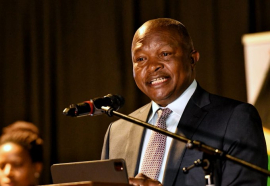
Deputy President David Mabuza says traditional leaders are a vital cog in the democratic governance system across all spheres of government.
“They remain central to the tasks of building safe and cohesive communities, and ensuring that our history, culture, languages and heritage are celebrated and preserved for generations to come,” Mabuza said.
Mabuza was speaking during an engagement with traditional leaders and the Khoi-San leadership in the Free State province.
Mabuza said in the face of social ills confronting communities, traditional leaders have an essential leadership role to play working with government to deepen a culture of human rights for all.
“As leaders, you have a critical role to play in reversing the scourge of crime, gender-based violence and substance abuse within communities,” Mabuza said.
Mabuza said working together with traditional leadership institutions, government is able to develop programmes that are responsive to challenges of unemployment, poverty and lack of key services in rural communities.
“We must address underdevelopment and infrastructure deficits in rural communities. This requires deliberate and targeted investments in rural infrastructure networks to provide access to water and sanitation, electricity and roads that connect communities to workplaces, schools and health facilities.
“It is common knowledge that traditional leaders have, over time, raised issues for consideration by government across a number of developmental aspects, including financial resources to build the capacity of traditional leadership institutions and structures to execute their mandates.
“Some of the issues are currently being implemented by government, whereas others remain in the pipeline for resolution and action,” Mabuza said.
Mabuza said at the highest level of government, there is a commitment to act with a sense of urgency in resolving a number of issues that traditional leaders have raised.
“As part of this commitment, the President established the Inter-Ministerial Task Team, chaired by the Deputy President, to oversee government’s coordinated approach and response to issues affecting traditional leaders throughout the country,” Mabuza said.
He said the dialogue held with the traditional leaders after the opening of the National House of Traditional and Khoi-San Leaders earlier this year laid an important foundation for ongoing engagements with traditional leaders in all the provinces.
Mabuza said land reform remains a critical national intervention to reverse the legacy of land dispossession, and advance restorative justice.
“We are committed to working with the traditional leaders to expand land access beyond what is currently available, and make sure that our land reform programmes achieve the desired transformative goals in an orderly and Constitutionally-defined manner,” Mabuza said. – SAnews.gov.za


